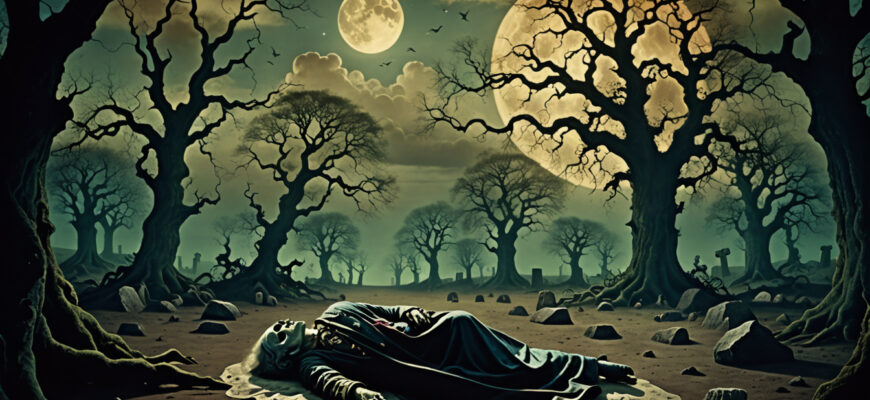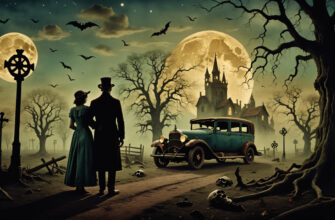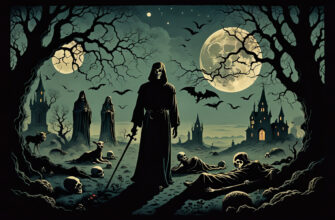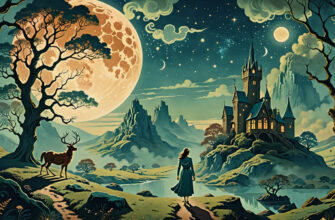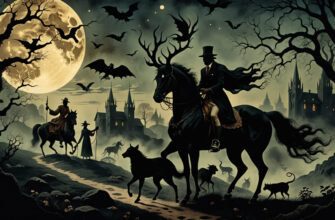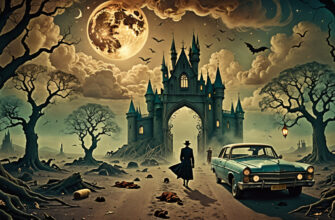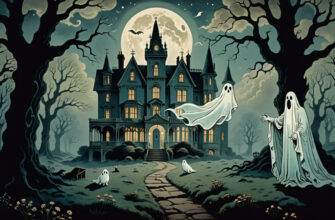Dreaming about death or the dead can easily trigger a spike of fear or confusion, especially when these images hit hard in the night. But what if those unsettling visions aren’t actually predicting doom? Instead, they whisper of something deeper: transformation, shifts, and endings that the mind is eager to work through. Often, a dream of death isn’t about actual physical death but a signal from your inner world that something is changing or finishing in your waking life. The psyche uses this bold symbol to nudge you toward reflection and growth, not to scare you into panic. What if these dreams are more invitations than omens, helping you face what needs to close so something new can begin?
- What Dreams About Death Represent Beyond Literal Meanings
- The Psyche’s Way of Signaling Endings, Transitions, and Deep Transformation
- Common Themes: Identity Shifts, Relational Letting Go, Inherited Wounds
- Astrology’s Role in Stirring Subconscious Material
- How Pluto’s Energy Invites Death and Rebirth Cycles Within the Self
- Saturn’s Lessons on Boundaries, Structure, and the Weight of Endings
- The Influence of Eclipses as Cosmic Triggers for Reckoning and Renewal
- The Moon’s Emotional Tides and Connection to Ancestral Memory
- Ancestral and Collective Dimensions of Death Dreams
- Receiving ancestral messages through death-themed dreams
- Reflecting collective grief and social losses in personal dreamscapes
- The role of inherited emotional patterns and the cosmic weather report
- How Dreams About Death Guide Us to Ritualize Closure
- The power and necessity of ritualizing endings in spiritual practice
- Reclaiming personal power in the process of letting go
- Honoring unique grieving and transformation journeys
What Dreams About Death Represent Beyond Literal Meanings
Dreams involving death don’t usually forecast an actual death but act as metaphors for transformation within your life. They often appear when you’re moving through endings—whether letting go of an old job, a relationship, or a part of yourself that no longer fits. The image of dying or encountering death in dreams can symbolize the shedding of outdated parts or beliefs, clearing the way for growth. They hold space for grief, uncertainty, or anticipation linked to these changes. Your mind is telling a story about passage, a liminal moment where holding on might be painful, but letting go promises renewal. These dream deaths can feel dramatic or even terrifying, but beneath the surface, they’re about evolution rather than actual loss.
The Psyche’s Way of Signaling Endings, Transitions, and Deep Transformation
When death shows up in dreams, it’s as though the psyche is using a universal symbol to announce a turning point. This often happens during times when something experiences a profound shift—emotional, relational, or even spiritual. The brain might be processing a breakup, a job change, or a shift in identity, signaling that it’s time to release the old and get ready for the new. Sometimes, these dreams can feel painful or confusing because endings rarely come easily. The discomfort is part of transformation’s labor. There’s a death to the old version of yourself before you can emerge renewed. More than just reporting external events, these dreams reflect the intricate dance of endings and beginnings playing out inside your mind and heart.
Common Themes: Identity Shifts, Relational Letting Go, Inherited Wounds
Death dreams tend to circle a few recurring themes that hit close to home:
- Shifting identities: You might dream about your own death as a way to signal a metamorphosis in how you see or feel about yourself.
- Letting go of relationships: Dreams featuring the passing of loved ones or yourself can be a rehearsal for emotional farewells or closure.
- Inherited wounds: Sometimes the dead that matter in dreams represent ancestral trauma or unresolved grief, calling attention to the patterns passed down through generations.
These dreams encourage processing not only personal change but also communal and family histories that linger beneath the surface. They often point to what feels unresolved—ghosts both literal and metaphorical that are ready to be faced and honored.
Astrology’s Role in Stirring Subconscious Material
Astrology offers a language to understand why death imagery might surge unexpectedly in your dreams. The cosmos aligns with inner tides, stirring subconscious material through specific planetary energies that invite cycles of ending and rebirth. These astrological forces can amplify what the psyche is ready to explore, providing guidance on timing and theme.
How Pluto’s Energy Invites Death and Rebirth Cycles Within the Self
Pluto, the ruler of transformation and regeneration, serves as the planet of death and rebirth inside the birth chart’s storytelling. When Pluto’s energy is active—through transits or natal placements—it mirrors the composting process of life, pulling up what must decay so something vital can grow. This power digs deep into hidden fears, attachments, and subconscious shadows. Dreaming of death under a strong Pluto influence might feel intense or dramatic because you’re right in the middle of a dismantling. But that dismantling is exactly what clears space for reincarnation and healing. Pluto asks: What do you need to let die so your soul can rise?
Saturn’s Lessons on Boundaries, Structure, and the Weight of Endings
Saturn doesn’t deal in drama but in reality checks. It brings the weight of responsibility, time, and limits, standing guard at the gates of what is finished. When Saturn stirs the psyche—like during a Saturn return or a tough aspect—dreams about endings, loss, and separation can emerge as reminders to set boundaries and tighten what’s needed. Saturn’s influence feels heavy but purposeful, encouraging maturity and acceptance of what simply cannot be stretched any longer. These dreams might present closure that’s overdue or the bittersweet necessity of saying goodbye to old ways of living and relating.
The Influence of Eclipses as Cosmic Triggers for Reckoning and Renewal
Eclipses act like cosmic trigger points, flinging open windows to shadowy corners of the self and the collective. Their sudden shifts can make feelings and images—including dreams of death—more vivid and urgent. During eclipse seasons, what feels buried or out of reach is often called into awareness, urging reflection and change. These periods can prompt reckoning with unfinished business, encouraging a rough but real clearing that creates room for something new. Dreams during eclipses often feel like messages coming out of the blue, rich with symbolism and raw emotion.
The Moon’s Emotional Tides and Connection to Ancestral Memory
The moon moves through the sky in phases, pulling tides within and without, affecting emotions, memory, and how we hold the past. It’s the celestial body most tied to the family line and ancestral stories. When the moon’s energy is strong—or activated in your chart—death dreams might bring an emotional flood, linking you to those who came before. These dreams can feel like visits across time, offering comfort, warnings, or the chance to reconcile with inherited grief. They remind us that our story is woven into a much larger one that lives in our cells and spirits.
| Astrological Influence | Theme in Death Dreams | Emotional Experience |
|---|---|---|
| Pluto | Deep transformation, death/rebirth cycles | Intense, cathartic, shadow exploration |
| Saturn | Endings, boundaries, maturity | Heavy, grounded, acceptance, responsibility |
| Eclipses | Sudden shifts, reckoning, renewal | Urgent, symbolic, emotional breakthroughs |
| Moon | Emotions, ancestral memory, lineage | Emotional, nurturing, reflective |
Ancestral and Collective Dimensions of Death Dreams
Receiving ancestral messages through death-themed dreams
Have you ever woken up from a dream of someone long gone, feeling like they had something to say? Dreams featuring death or the dead often serve as bridges between the living and ancestors, carrying whispers from our lineage. Different cultures treasure these dreams as sacred moments where past and present touch—sometimes offering comfort, sometimes urging us to address unfinished stories.
In such dreams, voices from ancestors may guide, warn, or remind. They might ask that you keep something alive—a tradition, a value, a healing process left dangling. These night-time visitations seldom forecast literal death, but instead invite reflection on how your heritage shapes your present. The moon, often linked to memory and ancestral presence in astrology, signals these emotional ties. When the moon activates ancestral connections in a birth chart or transit, death-themed dreams might be louder, calling attention to how you hold your past in your body and soul.
For example, a person with strong lunar influences dreaming of a deceased relative may find themselves receiving reassurance or repeating patterns that trace back generations. These dreams are a cosmic conversation, reminding that grief and memory are carried collectively, not just hidden in private sorrow.
Reflecting collective grief and social losses in personal dreamscapes
Sometimes, the death we dream about isn’t just personal—it’s communal. In moments when society collectively reels from loss—whether pandemics, violence, or broader cultural shifts—dreams echo that shared mourning. These night visions become emotional barometers, processing grief that extends beyond individual borders.
Imagine a community shaken by sudden upheaval, where many find themselves dreaming of disaster, mass death, or even symbolic deaths of ideas and ways of life. The psyche doesn’t separate personal pain from social wounds, so these themes rise in the night as reflection of broader anxieties about impermanence and transformation.
When the collective heartbeat stutters, dreams map that pulse through personal scenes, weaving social loss into intimate narratives. This experience reminds us that grief can ripple through generations and across communities, and death dreams often hold the space where such pain can be named and felt, working through the unseen ties binding us all.
The role of inherited emotional patterns and the cosmic weather report
Emotional inheritance is a tricky business. Sometimes what you carry in your dreams isn’t just your own feelings but echoes of trauma and loss passed down by ancestors. These patterns live beneath conscious memory, shaped by historical wounds that ripple through family lines.
Astrologically speaking, death dreams often flare up during significant cosmic events—Pluto transits, Saturn returns, eclipses—that act like a celestial weather report signaling heavy emotional currents. These times stir up what’s buried and summon inherited pain, urging you to face it inside the dreaming world.
For instance, if Pluto nudges key parts of your natal chart, dreams might reveal cycles of letting go linked to ancestral trauma or unresolved grief, making the invisible visible. These intense nights can feel like the cosmos is gently—or sometimes harshly—reminding you that healing happens across time, space, and through many lifetimes intertwined.
How Dreams About Death Guide Us to Ritualize Closure
The power and necessity of ritualizing endings in spiritual practice
When dreams bring death to the forefront, they aren’t just unsettling—they’re invitations to ritualize endings actively. The soul needs to mark transition points, to honor what’s ending so something new can begin. Spiritual traditions around the world emphasize ritual as a grounding tool for these liminal moments.
Ritual doesn’t have to be complicated. Lighting a candle, making an offering, or simply sitting with grief in ceremony can serve as a tangible act of acknowledgment. This practice helps shift unresolved, floating emotions into a container that can be held and safely transformed. It’s in these sacred endings that the psyche finds space to breathe and the heart can feel seen.
Consider a ritual after a death dream as a form of rebalancing—a way to say ‘goodbye’ to what’s no longer serving, making peace with endings, and opening oneself to whatever comes next.
Reclaiming personal power in the process of letting go
Death dreams often highlight parts of yourself ready to die so something truer can rise. While it’s scary to face what you must release, these dreams can also be empowering. They show that you have a choice—to resist or to surrender; to cling or to create new beginnings.
Reclaiming power here means owning your process. It might mean:
- Naming what no longer fits your life
- Allowing space to grieve the loss of identity or relationship
- Setting clear intentions for what you want to carry forward
When the old self dies, power doesn’t vanish—it transforms. You get to decide what seeds to plant in the fertile soil left behind. The courage to let go becomes a radical act of self-knowledge and liberation, a quiet rebellion against fear and stagnation.
Honoring unique grieving and transformation journeys
Everyone’s relationship with death, loss, and transformation is shaped by story, culture, and inner truth. No two grieving processes look the same, and dreams of death reflect this beautifully—sometimes terrifying, sometimes tender, always deeply personal. Honoring this uniqueness means resisting one-size-fits-all scripts and embracing your own way of walking through endings.
Transformation isn’t neat or linear. It often feels chaotic, with back-and-forth movement and unexpected detours. Death dreams invite you to meet this journey with compassion and patience.
Some might find solace in quiet solitude, others in community, rituals, or creative outlets like art or writing. Listening closely to your dreams can reveal clues about how you’re ready to move through grief. These nocturnal guides are your allies in holding the sacred tension between loss and new life, closure and beginning.
